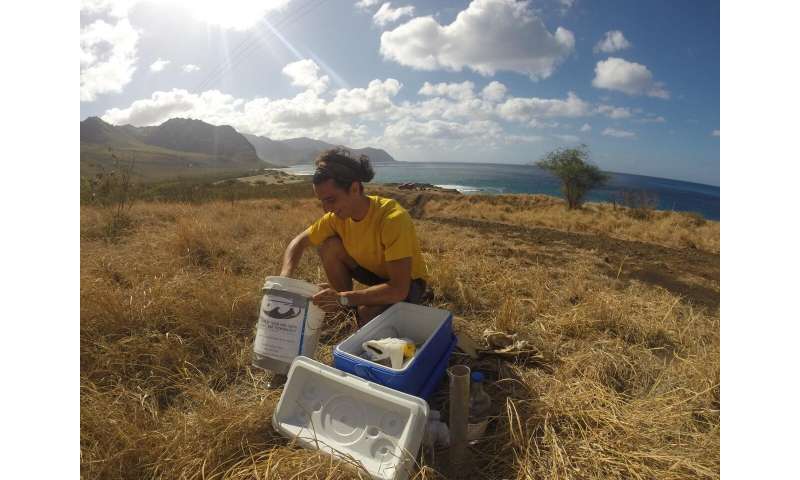by Marcie Grabowski, University of Hawaii at Manoa

Daniel Dores, lead author preparing rainfall collection equipment, West O'ahu. Credit: Michael Mathioudakis, UH Manoa
Located within the most isolated archipelago in the world, Hawai'i is critically dependent on a clean, ample supply of fresh water. New research led by University of Hawai'i at Mānoa scientists indicates that rain brought to the islands by hurricanes and Kona storms can often be the most important precipitation for re-supplying groundwater in many regions of the island of O'ahu.
"The majority of Hawai'i's freshwater comes from groundwater," said Daniel Dores, lead author and groundwater and geothermal researcher in the UH Mānoa School of Ocean and Earth Science and Technology. "In this study, we investigated the relationship between trade wind showers, major rainfall events like Kona storms, and groundwater."
Dores and a team of scientists from SOEST and the Hawai'i Department of Health collected rainfall around the island of Oahu and analyzed the stable isotopes of rainwater, chemical signatures in the water molecules. They compared the chemical signatures in rainwater to those of groundwater to determine the source of water in the aquifers—event-based rainfall or trade wind-related rain.
"Because windward and mauka showers are so common, it is easy to assume that is the main source of our drinking water," said Dores. "Also, large rainfall events such as Kona storms result in significant runoff into the oceans. However, our research found that a lot of the rain from Kona storms makes it into our groundwater aquifers and is an important source of our drinking water."
Hawai'i is experiencing substantial changes in trade wind weather patterns, and precipitation events could become more extreme. Some of the study co-authors will continue research to understand more about local and regional groundwater recharge and water quality.
"By better understanding how our groundwater is impacted by these extreme precipitation events, we can better protect the resource itself," said Dores.
Majority of groundwater stores resilient to climate change
More information: Daniel Dores et al, Implications for groundwater recharge from stable isotopic composition of precipitation in Hawai'i during the 2017–2018 La Niña, Hydrological Processes (2020). DOI: 10.1002/hyp.13907
Provided by University of Hawaii at Manoa
Located within the most isolated archipelago in the world, Hawai'i is critically dependent on a clean, ample supply of fresh water. New research led by University of Hawai'i at Mānoa scientists indicates that rain brought to the islands by hurricanes and Kona storms can often be the most important precipitation for re-supplying groundwater in many regions of the island of O'ahu.
"The majority of Hawai'i's freshwater comes from groundwater," said Daniel Dores, lead author and groundwater and geothermal researcher in the UH Mānoa School of Ocean and Earth Science and Technology. "In this study, we investigated the relationship between trade wind showers, major rainfall events like Kona storms, and groundwater."
Dores and a team of scientists from SOEST and the Hawai'i Department of Health collected rainfall around the island of Oahu and analyzed the stable isotopes of rainwater, chemical signatures in the water molecules. They compared the chemical signatures in rainwater to those of groundwater to determine the source of water in the aquifers—event-based rainfall or trade wind-related rain.
"Because windward and mauka showers are so common, it is easy to assume that is the main source of our drinking water," said Dores. "Also, large rainfall events such as Kona storms result in significant runoff into the oceans. However, our research found that a lot of the rain from Kona storms makes it into our groundwater aquifers and is an important source of our drinking water."
Hawai'i is experiencing substantial changes in trade wind weather patterns, and precipitation events could become more extreme. Some of the study co-authors will continue research to understand more about local and regional groundwater recharge and water quality.
"By better understanding how our groundwater is impacted by these extreme precipitation events, we can better protect the resource itself," said Dores.
Majority of groundwater stores resilient to climate change
More information: Daniel Dores et al, Implications for groundwater recharge from stable isotopic composition of precipitation in Hawai'i during the 2017–2018 La Niña, Hydrological Processes (2020). DOI: 10.1002/hyp.13907
Provided by University of Hawaii at Manoa
No comments:
Post a Comment